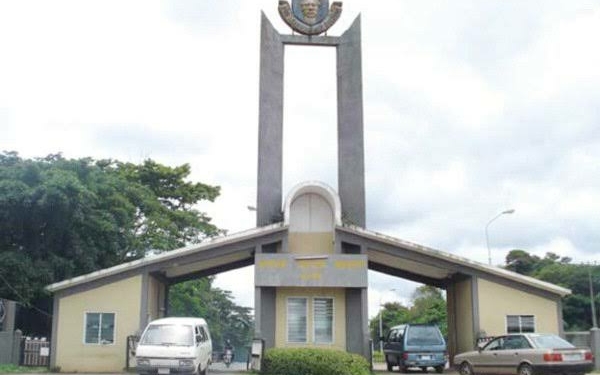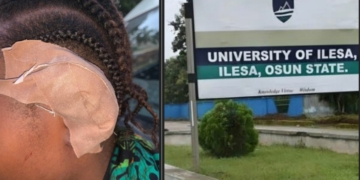Students of the Obafemi Awolowo University (OAU), Ile-Ife, Osun State, are moving out in droves from their hostels.
Reasons: ‘deplorable’ state of the hostels and what they called “creeping state of insecurity”.
In the past, the institution had a reputation as one of the most peaceful universities nationwide.
It has a history of zero tolerance for cultism and related activities.
There have been cases of kidnapping and ritual killings, though outside the university. Last month, the university received a note from a group of cultists who promised to unleash mayhem on the 57-year-old institution.
The last time such dastardly act occurred was 20 years ago, when the then general-secretary of the Students’ Union George Akinyemi Iwilade, fondly called Afrika, was killed alongside four others at the Obafemi Awolowo Hall of the institution.
The letter caused panic on campus. Some students scanned and shared it on their mobile phones.
The university also swung into action and arrested some suspects.
In a statement, the university said the cultists’ planned attack was foiled by its security unit which apprehended and handed over the suspects to the police.
“Obafemi Awolowo University has zero tolerance for cultism. No cultist can thrive on this campus. As far as we are concerned, when students are admitted on the first day in this university, they swear an oath of allegiance not to get involved in cultism, otherwise they are rusticated. Those who came here have been arrested and the police are handling the case,” Dean of Students Affairs Prof Ishiaq Aransiola told CAMPUSLIFE.
Yet, this reassurance did not stem the fear of many. Some students fled thier various hostels to live in town.
Two years ago, the management proscribed the Students’ Union over what it described as excesses and lack of leadership traits by the students’ body. The management has since insisted that it will not lift the ban until it sees a “refined students” body that is desirous of constructive dialogue. At present, only presidents of the various faculties manage students’ affairs.
At the 20th remembrance of Afrika’s death last month, students and other activists called on the school to restore the SU, saying: ‘one cannot throw the baby out with the bath water’.
Speaking with CAMPUSLIFE, the president of Faculty of Arts Students’ Association, Ayobami Adewale, lamented that the absence of the SU has adversely affected the security situation on campus. Aside the threat letter, the poor state of the hostel is also one factor why students are vacating in hundreds.
“There have been several reported cases of armed robbery outside the university campus and the students who live in town are filled with terror and fright,” Adewale said.
He continued: “Students living outside the university campus are thereby exposed to a lot of security risks, which is as a result of the inadequate provision of living spaces. However, many of the spaces are not conducive enough to absorb the ever growing population of students.”
Recently, the management revamped all the halls of residence, and therefater directed a reduction to a manageable number the population of occupants in the rooms. However, the students are describing the rehabilitation as merely ‘cosmetic’ as the toilets were left unfixed.
The institution’s Public Relations Officer, Mr Abiodun Olanrewaju, said the management responded to students’ earlier call for the upgrade of the hostels. Unfortunately, Olanrewaju said the same students now fumed when the management directed a reduction in students’ population even when it was glaring the measure was the best to take at such crucial time.
Olanrewaju said the students should be grateful for management’s efforts, adding that there are some universities that do not even provide accommodation for their students; yet the students still survive.
“The university is a place to struggle and survive; OAU students should therefore develop some survival skills to enable them achieve academic success while struggling through school,” Olanrewaju told CAMPUSLIFE.
According to him, it might require management to increase the cost of hostel accommodation to be able to make the facilities more habitable and befitting.
He said: “Till date, fresh students pay N3,090. The N90 is the only part that goes into the university confers while the rest is for maintenance of the halls. Tell me what you can buy with N90.It is the same amount I paid as a student here, but times have really changed as we all can see.
“The N3,090 being charged presently is barely enough to provide facilities and services that would meet up with global standards. Besides, it doesn’t conform with the current economic realities.”
Nontheless, Olanrewaju appealled to the alumni body to come to the rescue.
Corroborating Olanrewaju, Aransiola said management is taking the rehabilitiation of the hostel one step after the other.
“On the issue of toilets, you can’t do everything all at once. Toilet facilities are not adequate, and that is what we want to focus on now. As we speak, some toilets are being built and we want this to go round. There will be additional ones aside the ones we plan to renovate,” he explained.
Kenneth Idanwekhai, a final year History and International Relations, student, described the security situation on campus as ‘average,’ saying it could still be improved upon.
“The security (situation) is fair,” Idanwekhai began.
“However, we all want total security.
“I think the management is really trying. When there were speculations about cultists, the school really stepped into the situation and took some drastic steps to ensure the safety of students. Also, there have been reported cases of students being threatened with arms but the security system on campus has really looked into it.”
Like others students, Idanwekhai bemoanwed the poor state of accommodation on campus:
“I think the accommodation policy is extremely poor and frustrating. We are not being treated fairly. Again, the management has tried its part by repainting all the halls many of which are still dilapidated. Also the porters on campus are like demi -gods. They feel they have all the powers to do as they please. For instance, the room I stay is terribly leaking and they haven’t done anything to fix it. It is bad enough that my books and food stuff are badly affected. I’ve gone to complain and even written a letter to the hall management but there is still no improvement.”
Idanwekhai also pointed out the presence of pests that are vectors of diseases.
“Bed bugs, rats and other annoying pests frustrate students in the hostel; in summary, there are a lot of wrongs in the university’s accommodation system that need to be fixed,” he said.
Aliemeke Kelechi Praise, a 400-Level student of the English, pitched his tent behind a raise in the cost of hostel accommodation.
He said: “I stay in a private hostel popularly called maintenance and I pay a lot per annum. If I were given an option of staying in one of the halls with its proximity to academics, adequate security and improved facilities, I would gladly opt for such an alternative.”
Omolola Pedro, a 400-Level student of English, critised some of the directives by management in streamlining the hostels.
She said: “At the beginning of last session, the vice chancellor decongested the halls of residence on campus. As remarkable as the action was, the fact that there were no alternative measures in place is condemnable. This action has put students in severe danger as they all had to move to town where security isn’t so guaranteed. Even the campus that is supposed to be the safest isn’t anymore.”
According to her, all these could be curtailed if management reinstates the Students’ Union.
She added: “The major plea of students is that the university management provides more hostels first, after which they can now revoke the accommodation policy that has put the student in grave danger.”
As a student who is a resident in town, she said most landlords do not live in the same houses with students and are therefore apathetic to their plights.
Osungbade Akeem Wisdom, a 300-Level Zoology undergraduate and former Chairman of the Angola hall of residence, also lent his voice on the issue.
“The security of the university is nothing to write about especially in recent times. Although the university management brought in the DSS (Directorate of State Security) to tighten the campus security, still there are issues of suspected cultists invading campus amidst other security threats which are quite alien to the OAU we know,” he said.
He added: “This can’t be disconnected from the attack on students’ unionism. In a situation where students are not allowed to unite, all forms of vices begin to thrive.”
Going down memory lane, a former president of Junior Chamber International, OAU chapter, Temitope Ojo, recounted his experience as a student.
He said: “I was as free as a bird during our time. I could walk as late as 3am and as far the university’s Conference Centre. Many of us then did not know if it was the university’s security that was tight or the uncompromising culture of the students. I feel we weren’t just troublemakers and the Students’ Union was always very vocal when it comes to any sign of violence amongst students.
“Even if you were a former troublemaker, as long you enter the campus, you drop it at the gate. Only stealing within campus hostels happened and this is bound to happen when you have individuals across various backgrounds living together.”
A post graduate, Funmi Oyetola who had her undergraduate studies in the university, similarly recalled how she struggled all through her undergraduate years in order to get settled.
She said: “If the university can increase the rent charged with a commiserate improvement in the facilities and services provided, It would even boost academic performance as students will be better settled on campus and will therefore be able to devote their time and attention fully to studies.”
Nonethelessa, Aransiola, who is from the Department of Local Government Studies, opened up on some of the plans of the university to solve certain lingering issues that directly affect the students, especially, security, accommodation and transportation which still remain a major headache.
“When you solve a problem, another one arises. What we did was to deploy the university buses to ease the problem from campus to the gate.We have one big Marcopolo bus and two coastal buses plying campus gate.
“What the university is planning to do now is to get three additional buses,in fact the buses will arrive soon.We want to add them to the fleet of buses to ease the problem of transportation. We’ve informed some transport venture that would support what we have on ground.
On security, Prof Aransiola said “We are having meetings regularly and we walk hand-in hand with various security agencies. Security matter is not for one person, its for all of us.”
On accommodation, he said management is considering having more hostels through build, operate and trasnfer (BOT) basis.
“ What we do now is to contact vendors who would construct hostels on a Build-Operate-Transfer BOT agreement. The female students popularly known as ‘maintenance’ will be the phase one. The phase two will be around Parakin, while phase three is around Ede road. Both areas are in Ile ife and near the university campus. Now we are on phase three where contractors have started work.
Some hostels will be of 10,000 and 5,000 capacity respectively. As we speak, there is a hostel behind the Alumni hall of residence for our foreign but its not on a BOT agreement. We also regulate the prices charged by the hostel owners otherwise they would have jacked up the rents outrageously.




Discussion about this post